九年级unit6学案
牛津译林版九年级上册英语(新)学案:Unit 6 Task
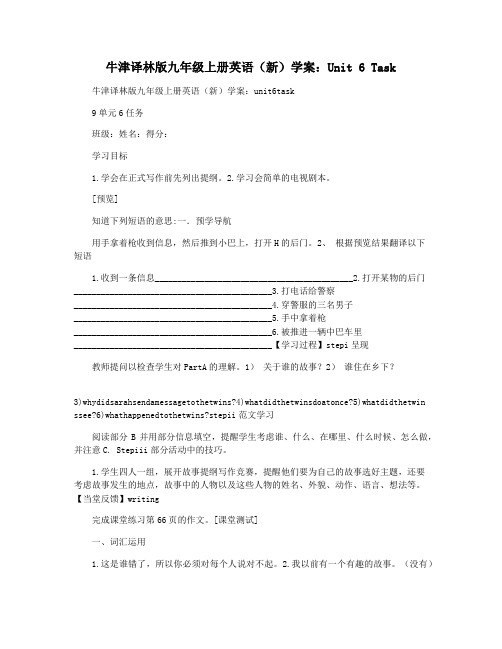
牛津译林版九年级上册英语(新)学案:Unit 6 Task 牛津译林版九年级上册英语(新)学案:unit6task9单元6任务班级:姓名:得分:学习目标1.学会在正式写作前先列出提纲。
2.学习会简单的电视剧本。
[预览]知道下列短语的意思:一.预学导航用手拿着枪收到信息,然后推到小巴上,打开H的后门。
2、根据预览结果翻译以下短语1.收到一条信息____________________________________________2.打开某物的后门____________________________________________3.打电话给警察____________________________________________4.穿警服的三名男子____________________________________________5.手中拿着枪____________________________________________6.被推进一辆中巴车里____________________________________________【学习过程】stepi呈现教师提问以检查学生对PartA的理解。
1)关于谁的故事?2)谁住在乡下?3)whydidsarahsendamessagetothetwins?4)whatdidthetwinsdoatonce?5)whatdidthetwin ssee?6)whathappenedtothetwins?stepii范文学习阅读部分B并用部分信息填空,提醒学生考虑谁、什么、在哪里、什么时候、怎么做,并注意C. Stepiii部分活动中的技巧。
1.学生四人一组,展开故事提纲写作竞赛,提醒他们要为自己的故事选好主题,还要考虑故事发生的地点,故事中的人物以及这些人物的姓名、外貌、动作、语言、想法等。
【当堂反馈】writing完成课堂练习第66页的作文。
人教版英语九年级全一册 Unit6 课时5 Section B 2a-Self Check 学案
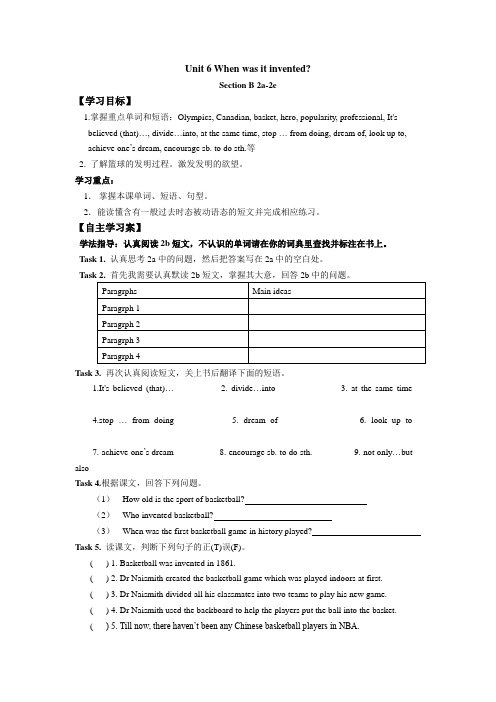
Unit 6 When was it invented?Section B 2a-2e【学习目标】1.掌握重点单词和短语:Olympics, Canadian, basket, hero, popularity, professional, It'sbelieved (that)…, divide…into, at the same time, stop … from doing, dream of, look up to, achieve one’s dream, encourage sb. to do sth.等2. 了解篮球的发明过程。
激发发明的欲望。
学习重点:1.掌握本课单词、短语、句型。
2.能读懂含有一般过去时态被动语态的短文并完成相应练习。
【自主学习案】学法指导:认真阅读2b短文,不认识的单词请在你的词典里查找并标注在书上。
Task 1. 认真思考2a中的问题,然后把答案写在2a中的空白处。
Task 3. 再次认真阅读短文,关上书后翻译下面的短语。
1.It's believed (that)…__________2. divide…into_____________3. at the same time _____________4.stop …from doing ___________5. dream of ____________6. look up to ____________7. achieve one’s dream ________ 8. encourage sb. to do sth. _________9. not only…but also_________Task 4.根据课文,回答下列问题。
(1)How old is the sport of basketball?(2)Who invented basketball?(3)When was the first basketball game in history played?Task 5. 读课文,判断下列句子的正(T)误(F)。
初三下Unit6学案导学及答案
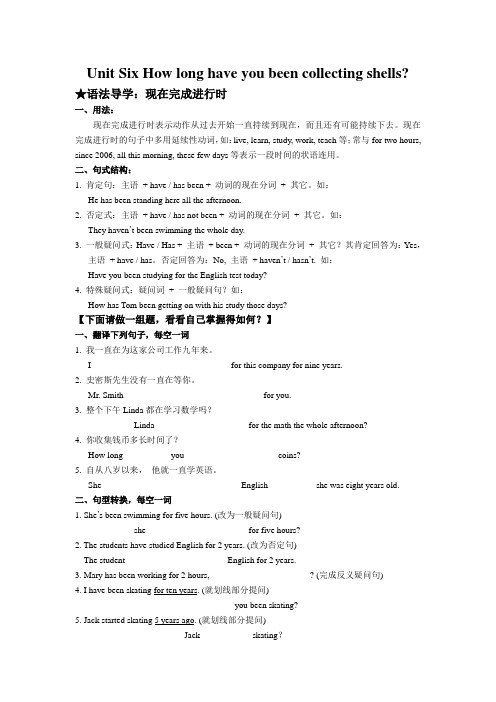
Unit Six How long have you been collecting shells? ★语法导学:现在完成进行时一、用法:现在完成进行时表示动作从过去开始一直持续到现在,而且还有可能持续下去。
现在完成进行时的句子中多用延续性动词,如:live, learn, study, work, teach等;常与for two hours, since 2006, all this morning, these few days等表示一段时间的状语连用。
二、句式结构:1. 肯定句:主语+ have / has been + 动词的现在分词+ 其它。
如:He has been standing here all the afternoon.2. 否定式:主语+ have / has not been + 动词的现在分词+ 其它。
如:They haven’t been swimming the whole day.3. 一般疑问式:Have / Has + 主语+ been + 动词的现在分词+ 其它?其肯定回答为:Y es,主语+ have / has。
否定回答为:No, 主语+ haven’t / hasn’t. 如:Have you been studying for the English test today?4. 特殊疑问式:疑问词+ 一般疑问句?如:How has Tom been getting on with his study those days?【下面请做一组题,看看自己掌握得如何?】一、翻译下列句子,每空一词1. 我一直在为这家公司工作九年来。
I __________ __________ __________ for this company for nine years.2. 史密斯先生没有一直在等你。
Mr. Smith __________ __________ __________ for you.3. 整个下午Linda都在学习数学吗?__________ Linda __________ __________ for the math the whole afternoon?4. 你收集钱币多长时间了?How long __________ you __________ __________ coins?5. 自从八岁以来,他就一直学英语。
牛津九年级上Unit6Main Task学案
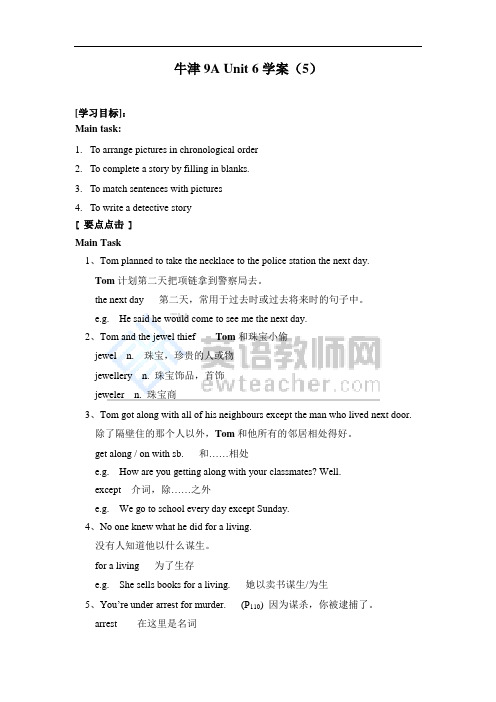
牛津9A Unit 6 学案(5)[学习目标]:Main task:1.To arrange pictures in chronological order2.To complete a story by filling in blanks.3.To match sentences with pictures4.To write a detective story[ 要点点击 ]Main Task1、Tom planned to take the necklace to the police station the next day.Tom计划第二天把项链拿到警察局去。
the next day 第二天,常用于过去时或过去将来时的句子中。
e.g. He said he would come to see me the next day.2、Tom and the jewel thief Tom和珠宝小偷jewel n. 珠宝,珍贵的人或物jewellery n. 珠宝饰品,首饰jeweler n. 珠宝商3、Tom got along with all of his neighbours except the man who lived next door.除了隔壁住的那个人以外,Tom和他所有的邻居相处得好。
get along / on with sb. 和……相处e.g. How are you getting along with your classmates? Well.except 介词,除……之外e.g. We go to school every day except Sunday.4、No one knew what he did for a living.没有人知道他以什么谋生。
for a living 为了生存e.g. She sells books for a living. 她以卖书谋生/为生5、You’re under arrest for murder. (P110) 因为谋杀,你被逮捕了。
牛津译林9上Unit6Reading2教学案

课题:Unit 6ReadingⅡ主备:赵青青课型:新授审核:区九年级英语备课组班级:姓名:学号:【教学目标】熟练掌握和运用本课出现的重点词组和句型。
【教学重难点】运用所学知识谈论自己喜欢的节目。
【教学手段】PPT【教学过程】Step1. Revision1. Revise the contents of the article and answer some questions.2. Complete the passage.Step2. Presentation and practice1. Master the language points in the passage.2. Learn and practice some useful phrases.3. Do some exercises.Step3. Homework1. Recite the important phrases.2. Finish off the exercises.【语法小贴士】1.A weekly round-up of what is happening in sport, with lots of up-to-date information. (Line 3, Page 80)(1) weekly用作形容词,意为“__________”。
e.g. 他们在进行每周一次的大扫除。
They are doing the ________cleaning.(2) weekly它还可以用作名词,表示“周刊”。
类似的用法还有e.g. 我已经买了一份周刊。
I have bought a ________.2.The programme covers different sports, such as basketball, swimming, badminton andfootball.(Line 4, Page 80)(1) cover用作动词,意为“包含,包括,涉及”。
九年级英语Unit6预习学案
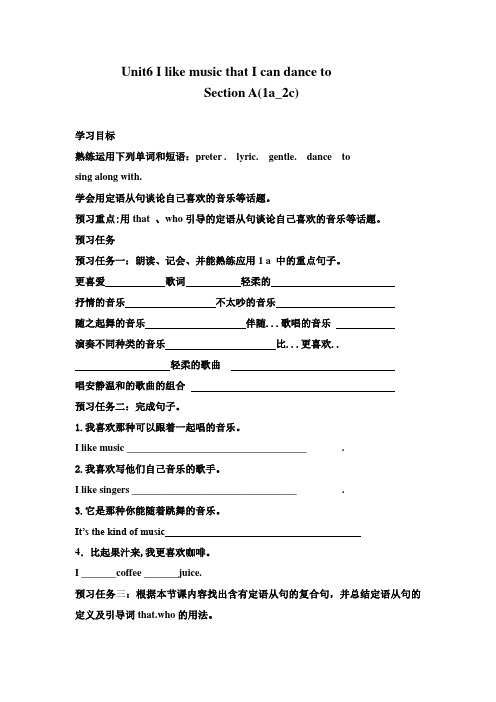
Unit6 I like music that I can dance toSection A(1a_2c)学习目标熟练运用下列单词和短语:preter . lyric. gentle. dance tosing along with.学会用定语从句谈论自己喜欢的音乐等话题。
预习重点:用that 、who引导的定语从句谈论自己喜欢的音乐等话题。
预习任务预习任务一:朗读、记会、并能熟练应用1 a 中的重点句子。
更喜爱歌词轻柔的抒情的音乐不太吵的音乐随之起舞的音乐伴随...歌唱的音乐演奏不同种类的音乐比...更喜欢..轻柔的歌曲唱安静温和的歌曲的组合预习任务二:完成句子。
1.我喜欢那种可以跟着一起唱的音乐。
I like music ____________________________________ .2.我喜欢写他们自己音乐的歌手。
I like singers _________________________________ .3.它是那种你能随着跳舞的音乐。
It’s the kind of music4.比起果汁来,我更喜欢咖啡。
I _______coffee _______juice.预习任务三:根据本节课内容找出含有定语从句的复合句,并总结定语从句的定义及引导词that.who的用法。
预习诊断一.选择1. I prefer watching TV to ______ music every day.A. listen toB. listenC. listening toD. listening2. Look at that girl ______ name is Lucy.A. whoB. whoseC. whichD. whom3. I like the music that I can sing ______.A. along andB. along withC. withD. along4. I like this kind of music that I can dance ______.A. toB. inC. withD. alongsk week I lost the watch my uncle bought for my birthday .A. that B .which C . / D. A,B and C二.首字母填空1. He p groups that play quiet and gentle songs.2.He likes music that has great l3.I like music that I can d to4.This is her f group and she often listens to their CDs. with .5 Lucy prefers music that is quiet and g .预习质疑_____________________________________________课中实施(一)预习交流1、小组讨论。
新目标英语九年级上册Unit 6 Section A1 (1a-2d) 优学案(含答案)
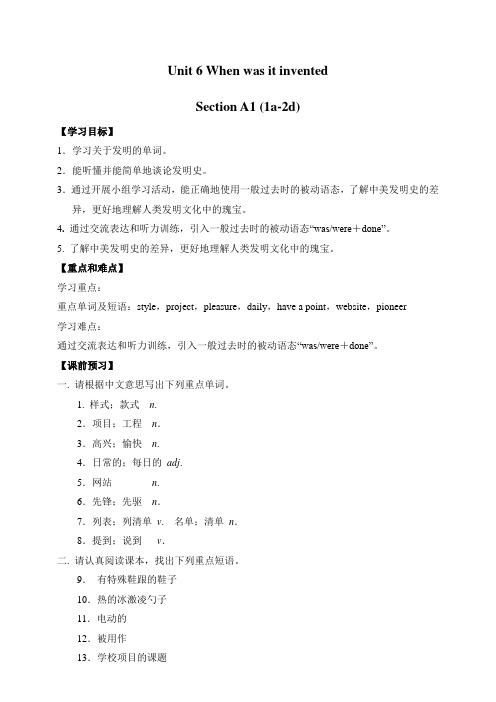
Unit 6 When was it inventedSection A1 (1a-2d)【学习目标】1.学习关于发明的单词。
2.能听懂并能简单地谈论发明史。
3.通过开展小组学习活动,能正确地使用一般过去时的被动语态,了解中美发明史的差异,更好地理解人类发明文化中的瑰宝。
4. 通过交流表达和听力训练,引入一般过去时的被动语态“was/were+done”。
5. 了解中美发明史的差异,更好地理解人类发明文化中的瑰宝。
【重点和难点】学习重点:重点单词及短语:style,project,pleasure,daily,have a point,website,pioneer学习难点:通过交流表达和听力训练,引入一般过去时的被动语态“was/were+done”。
【课前预习】一. 请根据中文意思写出下列重点单词。
1. 样式;款式n._____2.项目;工程n._____3.高兴;愉快n. _____4.日常的;每日的adj. _____5.网站n. _____6.先锋;先驱n._____7.列表;列清单v.名单;清单n._____8.提到;说到v._____二. 请认真阅读课本,找出下列重点短语。
9.有特殊鞋跟的鞋子___________10.热的冰激凌勺子___________11.电动的___________12.被用作_____13.学校项目的课题_____14.我们的日常生活_____15.有道理_____三. 请用以上重点短语完成下列句子。
16.它们是用来做什么的?What are they_____ _____ ?17.我认为电视机是在汽车之后被发明的。
I think the TV _____ _____ _____ the car.【合作探究】探究一、浏览1a, 1b中的图片,参考发明时间和发明家试着完成表格。
Time: 1876, 1885, 1927, 1971, Inventors: Carl Bens, Alexander Bell, J. L. Baird, John V on Neumann探究二、仔细阅读下列短语,在书中标记。
人教版英语九年级全册Unit6SectionA知识点学案

本次课教案:【温故知新】1. 因……而出名___________________________2. 避免做某事_____________________________3. 根据___________________________4. 自然环境的___________________________5. 国际的___________________________6. no matter ___________________________7. everyday ___________________________8. chopstick ___________________________考点一:I think the TV was invented before the car. 我认为电视是在汽车之前被发明的。
(P41)【考点梳理】此从句是一般过去时的被动语态。
一般过去时的被动语态的基本结构为:_________________________________I think the computer was invented after the car.【小试牛刀】()—Simon,do you know who invented the kite?—Sure! It _________ by Mozi over 2,000 years ago.A. is inventedB. inventedC. was inventedD. will be invented考点二:What are they used for? 它们是用来做什么的?(P42)【考点梳理】be used for的用法be used for 意为“被用来做……”,介词for后跟名词、代词或动名词做宾语,强调用途。
The sweaters are used for keep ing us warm in winter.The cloth is used for mak ing clothes.【小试牛刀】()—I hear your grandpa has an old cup in your home.—Yes. It ______ drinking tea long ago and my grandpa ______ drink tea with it when he was young.A.was used to; was used toed for; used toC.was used for; was used toD.was used for; used to考点三:With pleasure! 我很乐意!(P42)【考点梳理】With pleasure!的用法“with pleasure!”意为“乐意效劳!很愿意!”。
- 1、下载文档前请自行甄别文档内容的完整性,平台不提供额外的编辑、内容补充、找答案等附加服务。
- 2、"仅部分预览"的文档,不可在线预览部分如存在完整性等问题,可反馈申请退款(可完整预览的文档不适用该条件!)。
- 3、如文档侵犯您的权益,请联系客服反馈,我们会尽快为您处理(人工客服工作时间:9:00-18:30)。
Unit6 I like music that I can dance to 复习学案用括号内所给的内容来填空:定语从句:放在名词后修饰名词的从句叫定语从句一1被定语从句所修饰的名词叫_________(先行词名词形容词)2 先行词是人的用 _____ ,先行词是物的用______(that which who ) 先行词是地点的用_______,先行词是时间的用______ 先行词是原因的用________(when why where )3 ______在从句中做主语,______在从句中做宾语,______在从句中做定语即:whose+名词+谓语动词 (who whom whose)在定语从句中,有that which who同时出现的要优先选择_______(that which who)4 定语从句的谓语动词由_______的数来决定,先行词是单数,定语从句的谓语用________, 先行词是复数,定语从句的谓语用_______(先行词名词单数复数)先行词前有the only/very 最高级/有序数词要用______(that/which/who),先行词是不定代词,要用that5 prefer的用法:prefer______ (do doing)=== like ...better:更喜欢做某事; prefer doing to ______sth( doing do):比。
更喜欢。
注意:prefer与 to后的词性与形式要一致(即prefer 后是名词,to后也要用名词;prefer后是动词-ing,to后也要用动词-ing)prefer to do sth rather than ______sth===would ratherdo sth than _______sth(doing do)与其。
不如。
;宁愿。
也不愿。
6 What do you think of sth/sb?你觉得某人/某物怎么样?===How do you like?答语 I like/enjoy it a lot7suggest :显示/表明/暗示(主语是物而不是人)Suggest doing sth:建议做某事(主语是人)Sb+suggest+(that)sb+(should)+do sth:建议某人去做某事(从句用should +动词原形,should省去)8 six-month 六个月;six-month由“数字+连字符+名词”这种结构中名词要用______(单数复数),放在名词前做定语9 one of +________ _______ (比较级/最高级/单数/复数):其中。
之一10 over the years这些年;常与_______时态连用(过去时态现在完成时态)11 although/though尽管,虽然:although/though不能与______连用,有了although/though,就不能用_______,有了but,也不能用although/though;同样地,because也不能与______连用(so but) 二英汉互译和着。
跳舞________ 伴唱____________ 使某人想起某事_________老实说__________ 适合某人___________ 远离____________ 保持健康__________ be important to __________ Latest movies____________ play different kinds of music_____________________ sing the wordsclearly______________________三词汇音乐music--_______ 音乐家叫 /打电call-_______称作sing唱歌-______ 歌手开心happy-________ 不开心印度India-_______ 印度的意大利Italy--______ 意大利的巴西Brazil-________巴西的四选择题1 Beijing is one of the______in the world todayA busiest cityB busiest citiesC busy citiesD busy city2 Look at the boy _______name is JimA whoB whoseC whenD which3 She suggested you _______a good rest when you were tiredA havingB haveC to haveD had4 She is not a girl who _____ talk too much with othersA likesB likeC likes to Dlike to5 _____ his parents didn’t ask him to do the homework,_____he did it.A Although ,butB Though ,butC /thoughD Though,/6 My parents want to _______ on vacationA somewhere interestingB interesting somewhereC anywhere interestingD anywhere interesting7 Zhou wei is tallest boy _______from the countryA whoB whomC whoseD that8 I prefer swimming to _______musicA listenB listenC listen toD listening to9My brother is an ________ boyA eight-years—oldB eight-year—oldC eight year oldD eight years old10 The music reminds me _____ my hometownA ofB toC in Dfor11 Over the years,He ______ many moviesA has madeB madeC makesD to make12 My money is not the only thing ______ is missing.A. whichB. thatC. whoD. whose13 Do you know what ______?A. his favourite song isB. is his favourite songC. his favourite songD. his most favourite song is14. I like the music that I can sing ______.A. along andB. along withC. withD. along15. I like this kind of music that I can dance ______.A. toB. inC. withD. along16 Do you know what ______?A. his favourite song isB. is his favourite songC. his favourite songD. his most favourite song is17 No matter what you do, you can’t change the situation.A. whoeverB. whereverC. whateverD. what ever18 Mary sings English songs well and ______.A. Jane does tooB. either does JoesC. so Janes doesD. so does Jane19. I didn’t know ______. A. where does he live B. where do he livesC. where does he livesD. where he lived20 I hate people ______ talk much but do little.A. whoB. thatC. whichD. whose五用所给单词的适当形式完成句子。
1. My father likes French food, while my mother prefers ______ food. (Italy)2. Kevin is ______ in stamp collection. (interest)3. Look at these ______! I took them in Paris. (photo)4. Are there many ______ students in your university? (India)5. We had a great time with the ______in this village. (fisherman)6There is a village ______(call) Gun Tree7 I like the ________(music)who write their lyrics。
